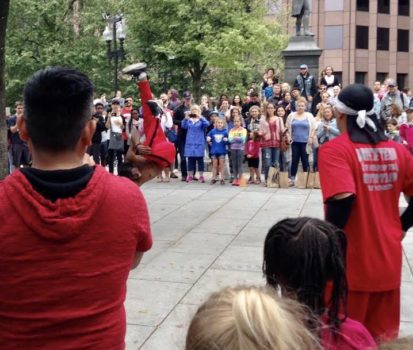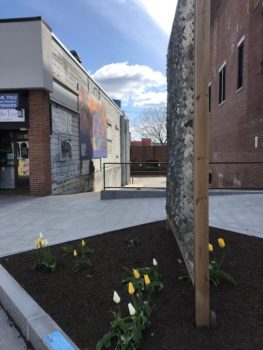
Photo of breakdancing in Boston by John O. Harney.
The emphasis on humanities has swung like a pendulum through the years, particularly in the world of higher education. Many perceive it as a discipline of the elite that attempts to connect us to distant places from times long ago that are mythical, historical or hypothetical, and somehow more important than today. Simply stated, humanities has the connotative power to scare people away from it. What’s not always obvious is that humanities is a shortened way to say “the human experience.” By accident, it seems the term humanities has helped marginalize the human experience itself. It’s packaged in ways that often result in a one-dimensional forced indulgence of quasi-appreciation.
Let’s break it down. The COVID-19 pandemic has already started reshaping everyone’s lives. Make no mistake, we are living in times that have demanded a fundamental reexamination of the human experience. Books across all genres will be written about the pandemic. Some will suggest how everyday life systems may pivot slightly or be radically reinvented in ways nearly unrecognizable, ranging from helpful to hellish. Whatever is written will illustrate the humanity of the current day and will be read for generations to come. In other words, it will illustrate what we value, which is not often the way the humanities are framed.
We’re failing to communicate that the humanities are nothing more than the study of the human experience, the conditions under which we experience it over time and how they form our values. The human experience itself is what guides us to understanding anything at all. The point is to understand and respect the values of others as they relate to their experience, more than a rote recitation of the experience itself.
In thinking of contemporary ways to help frame and illustrate the humanities beyond distant classics in literature, philosophy and art, we’re going to have to do things differently. We need to focus on healing and offer as many options as possible to facilitate healing from this collectively traumatic experience. We need to do so being clear that it might take a long time and be very difficult for a lot of people. Everyone is struggling—we may never know how much because we live in a place that is often not kind to those in pain. What we give and receive in the human experience is rooted in values.
Let’s be creative. As an evolving field, creative placemaking is one way to recognize and amplify shared values in the ways humans often crave. Creative placemaking happens through the intentional collaboration of artists, arts-based organizations and others working together to purposefully create physical spaces that center around arts and culture in ways that reflect the values and enhance human experiences in a community. As a student earning a Certificate in Creative Placemaking, I’ve learned that placemaking is really a process akin to the human experience; it is multidimensional and complex, with simple and infinite intersecting intentions.

Photo of public art in Concord, N.H. by Keisha Venson Sheedy.
The National Consortium for Creative Placemaking offers the compassionate vision for practitioners to revisit their efforts to support current human needs of healing, recovery and resilience. This includes evaluating projects to better understand if they are achieving that vision of support. Creative placemaking is down to earth—neither pretentious nor self-serving. It is a vehicle driven to amplify people, force positive social friction and ultimately reflect collective values, which, for many, has now become persisting through trauma and complex change.
There is no question that concepts and drafts of the many soon-to-be-published books about COVID-19 are already being realized. The stories told will depend upon whose human experiences are deemed most valuable. Whose narratives are worth sharing? Whose experiences will be captured and what messages will be gleaned from them? What emotions will they evoke or provoke? Will readers understand that these pieces of humanity carry an enormous capacity to foster healing? Twenty-five years from now, which of these books will become contemporary classics lauded as beautifully written reflections? Which of them will be seen as gritty works rooted in scrappy human experiences? It’s fair to expect both, because people process and heal differently.
We won’t need to wait that long. In the near future, it is likely first-semester college students will see recently designed humanities-focused general education courses that underscore COVID-19 as a contextual backdrop. Although it might be triggering, that relevance might best make the point about what and why humanities-coded courses are life relevant … in this case, striking them where they are in their lives at that moment.
Southern New Hampshire University (SNHU) has been steadfastly reimagining higher education for the past decade specifically to spark learning where people are experiencing life now. Having long held its finger on the pulse of all things education, it’s now respected by many as a heartbeat, central nervous system, spinal cord and mindful force for education in ways that set examples, empathize and support anyone struggling to cope. SNHU embodies anticipatory changes in the human experience. Taking influence from strategic foresight, scenario planning and project management, the university helps mitigate the marginalization of human experiences that have not happened yet. The future is humanity: The human experience is the future of everything we can imagine and the center of everything plausible.
Let’s build it up. What will we see? It’s reasonable to anticipate—and quite frankly demand—that creative placemaking practitioners collaborate toward beautiful spaces, transformed around artistic expression that honor the human lives lost due to COVID-19. Envision a storytelling festival. Envision a city mural dedicated to first responders. Envision art as healing in renewed ways to educate. Envision greater differentiation in higher education across disciplines for learners who need it, allowing artistic expression to demonstrate mastery while affording the chance for healthy, therapeutic self-expression. Envision the blooming of new ways to enhance human experiences at work (the way, for example, that New Hampshire Humanities has earned a reputation for doing). Envision mindfully caring in this moment—an undoubted shared value during universally complicated times.
On daily walks during COVID-19, the memoir audiobooks of Michelle Obama’s Becoming and Gabrielle Union’s We’re Going to Need More Wine both lit up my intellect, my spirit and the heartrate on my fitness watch. It’s obvious why Becoming won a Grammy. And I can’t help but wonder if as many people would indulge with these incredible works had they been framed as humanities texts, particularly if you didn’t know who these women are? Honestly, I doubt it, which is part of the whole point. As a matter of fact, they are humanities texts that could legitimately be listed as required reading for a general education course this fall. Let’s rethink humanities down to the level of how we pitch texts to read and accept and anticipate the need for arts-based differentiated assignments.
Let’s shift to be more creative and practical about promoting healing. Holding on to the belief that previous daily norms will quickly resurface is both commonplace and hopeful. But wondering about what’s next, framed with only the mindset and considerations of picking up from exactly where we left off—before every living human experienced some degrees of the pandemic—is neither hopeful nor realistic.
Achieving this practical, creative shift is not necessarily easy to do, given our inherent predisposition to expect immediate results, instant economic preferences, incessant stimulation and learning by being taught, rather than through self-direction and introspection. Maybe higher education communities can reframe the humanities by promoting learning through the memoirs of contemporary, living humans (including the works now being written by COVID-19 survivors). Maybe creative placemaking can influence more higher education communities to prefer that students take a trip to that storytelling festival or view the city mural as evidence of their capacity to appreciate the human experience. Envision these shifts reframing the human experiences that traditional humanities often overshadow and unwittingly marginalize.
Keisha Venson Sheedy is an innovation analyst with Southern New Hampshire University’s Innovation Center, delivering project management support for strategic initiatives that amplify the university’s dedication to access and equity in education. She previously worked in diverse roles in higher education at Plymouth State University, Granite State College, DePaul University and Columbia College Chicago. She is pursuing a Certificate in Creative Placemaking at the Institute of Art and Design at New England College, with particular interest in the evolving demographic identity and 2030 vision of Concord, N.H.
[ssba]
